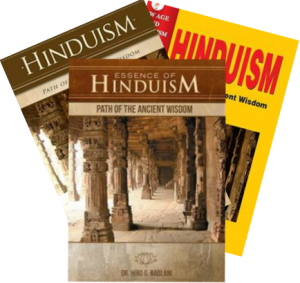In the Katha Upanishad, there is an important piece of dialogue between the seeker of knowledge, Nachiketa, and Yama, the lord of death.
Nachiketa was the young son of Vajasarva. He was barely twelve years old when, as a witness to a sacrificial ceremony of his father, a disturbing thought entered his mind. He confronted his father and challenged him about the futility of sacrifice of old, unproductive, and useless cows. Nachiketa reminded his father to sacrifice something that is more important instead. On being repeatedly questioned by his son, Vajasarva announced in disgust, “I am sacrificing you, Nachiketa, to the lord of death, Yama!”
Nachiketa arrived at the home of Yama, the lord of death, and waited for three days, without eating any food or even drinking water. When Yama returned, he was told about this, and he was immediately struck by the supreme effort of the young boy. He then offered three boons to Nachiketa as reward for this austerity.
As his first boon, Nachiketa requested, “May my father be relived of all anxiety and anger in regard of losing me. May he sleep in peace.” The boon was immediately granted.
As his second boon, Nachiketa requested, “May I know all the rituals of the fire sacrifice, which would ultimately lead an individual to be released from fear of death, and heaven.” This boon, too, was granted without any hesitation.
Nachiketa then asked as the final boon, “What happens to man after the death? Some say he exists after the death; others say he does not exist. I wish to know from you, Yama, the lord of death, this vital secret of the hereafter!”
Yama, on hearing this, offered Nachiketa many other temptations as alternatives to this inquiry. This he did to test the young Nachiketa about his resolve in seeking the spiritual knowledge of this nature. Finally satisfied with Nachiketa’s sincerity, Yama imparted the most intricate instruction to young Nachiketa thus:
“To man come both the good (shreya) and the pleasant (priya) things in life. The wise, who discriminate, choose the good, but the foolish, who do not discriminate, choose the pleasant for the sensual satisfactions. The path of the good leads to God; to the imperishable spiritual kingdom; the path of the pleasant leads to the perishable domain of physical birth and death cycle.”
Written thousands of years ago by Hindu seers; the “Upanishad of the Hereafter” has become a subject of intense philosophical discussions across the world.
“Fools dwelling in ignorance, yet imagining themselves wise and learned, go round in crooked ways like the blind leading the blind.” The ignorant do not think of the hereafter. They are mentally blind to what happens in the future.
Hindu seers paved the way of permanent joy in the virtue of God, rather than in the transitory pleasures of the senses. Worldly pleasures were subordinated to internal joy. Thus was sown the seed of renunciation of the material possessions in Hindu spiritual life. “He who does not possess discrimination, whose mind is uncontrolled and impure, he does not reach that goal, but falls again and again into samsara, the realm of birth and death cycle.”
In this Upanishad is laid the foundation of the Hindu philosophy of reincarnation, according to karma. The final destination of salvation (moksha) would come when the individual completely surrenders the ego and unites with the Divine. Hindu sages envisaged human life as the final step on the ladder of evolution, after which the being would merge with the Supreme Divine (after many birth cycles) by performing the highest practices of sacrifices, austerities, and meditations. Such is the essential Hindu notion of birth cycle, samsara. A being has to undergo the process of life repeatedly, for eons of births, until all spiritual teachings are perfected.
Life after death (reincarnation) has been one of the most important philosophical concepts in Hinduism. This phenomenon has kept the minds of Sages occupied for a very long time. Human life is regarded as the most precious, not just because of the development of mind and intellect, but also because human beings have the capability to develop higher levels of superior consciousness of divine merits of virtue and morality. Ordinary intellect often strives for material benefits known to bring pleasure. Instead, the sages prompted mankind to focus on living a life of spiritual value and virtue. The final destination of salvation (moksha) is achieved only when the individual completely surrenders the ego and unites with the Divine. Hindu sages envisaged human life as the final step on the ladder of evolution, after which the being would merge with the Supreme Divine (after many birth cycles) by performing the highest practices of sacrifices, austerities, and meditations. Such is the essential Hindu notion of birth cycle, samsara.
NOTE: Quotes in this chapter are adapted from Swami Parmanand The Upanishads. Cohasset, Mass.: Vedanta Center Publishers, 1981.




